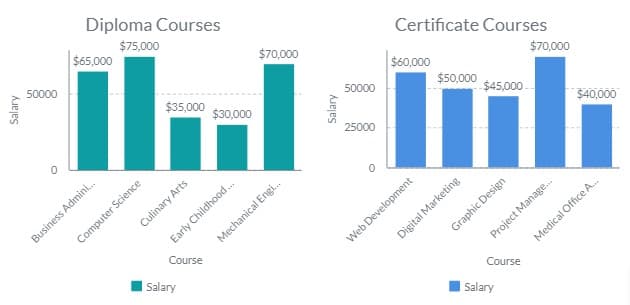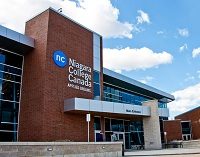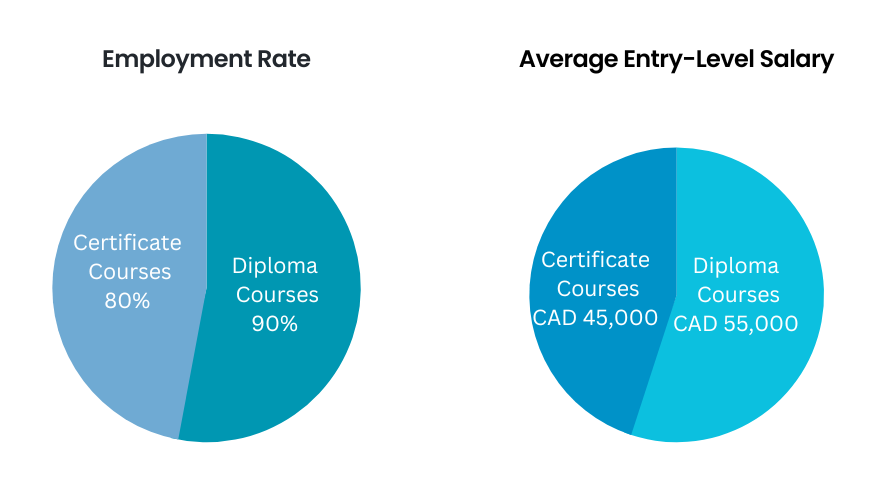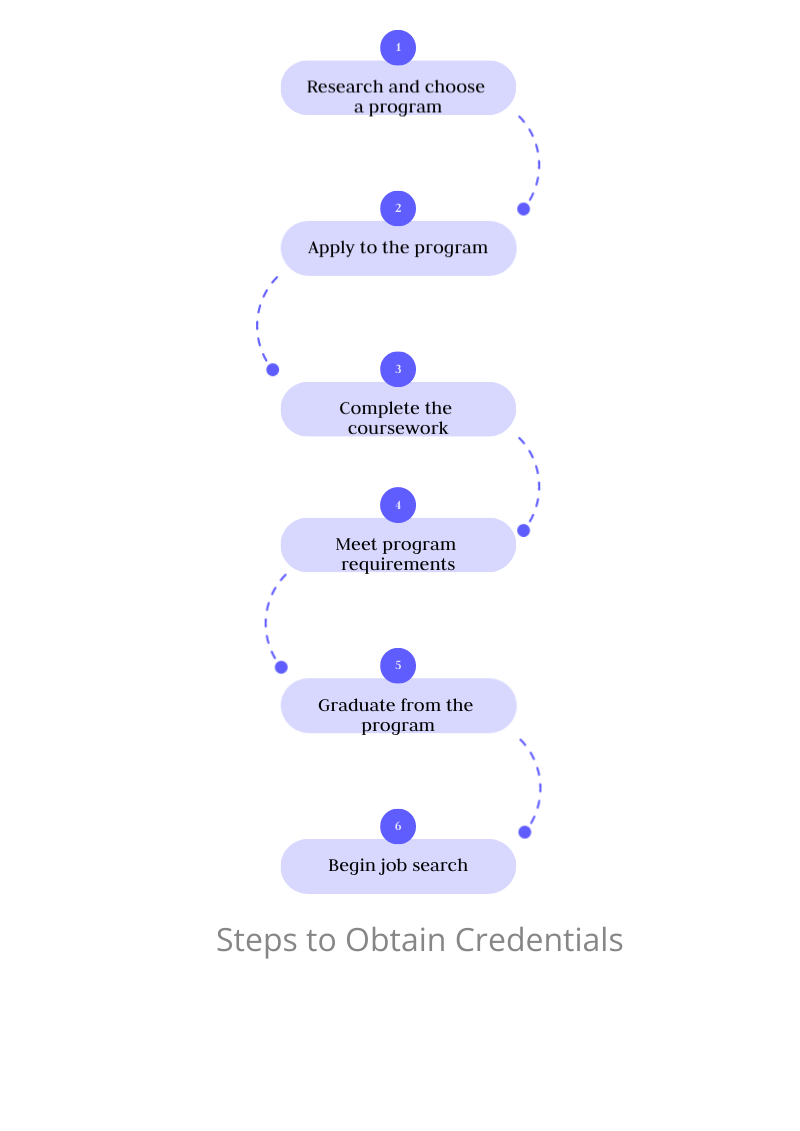Are you looking to enhance your career prospects or gain new skills? Then, Diploma or Certificate courses could be a right choice for you. In this article, we’ll see diploma vs certificate courses in Canada and help you understand the differences between these two along with the factors to consider while making a choice.
what is diploma course
A diploma is a short course of study which emphasizes on developing skills and provides specialization by practical experience in a specialized training program in a particular study area. The courses can be of a yearly or semester pattern just like the degree programs but shorter.
what is certificate course
Certificate courses are usually shorter than diploma courses and provide skill based training which can give you a competitive advantage over others. Certificate courses do not follow a semester pattern, however, the timeline could be similar to diploma courses at certain times.
Differences between diploma courses and certificate courses
| Criteria | Diploma Courses | Certificate Courses |
|---|---|---|
| Duration | 1-3 years | A few months to 1 year |
| Program Focus | Broad and comprehensive, covering a range of subjects related to a particular field or industry | Narrowly focused on a specific skill or topic |
| Entry Requirements | High school diploma or equivalent | High school diploma or equivalent; some may require prior work experience |
| Curriculum | Includes general education and core courses in addition to elective courses related to the program of study | Focuses primarily on practical, hands-on training in a specific skill or topic |
| Credit Hours | Typically 60-120 credit hours | Typically 12-30 credit hours |
| Career Opportunities | Broad range of career opportunities, including entry-level and mid-level positions | Limited career opportunities, typically entry-level or lower-paying positions |
| Academic Standing | Considered a higher level of education than a certificate | Considered a lower level of education than a diploma |
| Continuing Education | Can be used as a stepping stone to further education, including bachelor’s or master’s degrees | May not always transfer as credits towards a degree program |
| Cost | Typically more expensive than a certificate program | Typically less expensive than a diploma program |
| Examples | Diploma in Business Administration, Diploma in Early Childhood Education | Certificate in Medical Billing and Coding, Certificate in Web Development |
Importance of choosing the right type of program for your career goals
When it comes to pursuing further education, choosing the right program is key to achieving your career goals. In Canada, while both diploma and certificate programs offer benefits, the choice ultimately comes down to your individual career goals. Let’s see why it’s important to choose the right type of program for your career goals, and what factors you should consider when making your decision.
- Career Goals: Think about what you want to achieve in your career, and what skills and knowledge you need to get there. Consider the industries you’re interested in and the job roles that align with your interests.
- Program Content and Depth: Diploma courses typically offer a broader range of courses, providing a more comprehensive education. Certificate courses, on the other hand, are more focused on specific skills or areas of expertise. Consider the type of knowledge and skills you want to acquire, and choose a program that aligns with your goals.
- Program Length: Diploma courses are typically longer than certificate courses, allowing for more in-depth exploration of subject matter. Certificate courses, on the other hand, are shorter and allow for quicker acquisition of specific skills. Consider the amount of time you’re willing to invest in your education and how it aligns with your career goals.
- Program Requirements: Diploma courses may include internships, co-op placements, and capstone projects, while certificate courses may have fewer requirements, with a greater focus on coursework. Consider what type of learning environment and requirements suit your learning style and career goals.
- Career Opportunities: Diploma courses offer a broader range of career opportunities due to the comprehensive nature of the program. Certificate courses, on the other hand, may be limited to specific roles or industries but can provide specialized knowledge and skills. Consider the job market in your chosen industry and how each program can prepare you for success. You can also checkout this Temporary Foreign Worker Visa if you wish to stay for a while.
Do checkout the Canada updated rules for International Students in 2026
advantages & disadvantages
| Feature | Diploma | Certificate |
| Job Openings | Strong growth (projected 7.2% by 2030) | May be limited depending on the field |
| Earning Potential | Higher median income (around $52,000) | Lower median income (around $43,000) |
| Job Roles | Wider range of positions within an industry | Entry-level or technician roles |
| Further Education | Pathway to bachelor’s degrees | Entry-level or technician roles |
| Time Commitment | 1-3 years | A few weeks to a year |
| Cost | Higher due to program length | Lower cost option |
| Skills Focus | Broader skillset and knowledge base | Targeted expertise in a specific niche |
| Career Progression | More opportunities for advancement | Limited career advancement opportunities |
Best Diploma and Certificate Courses In Canada
| Diploma Courses | Certificate Courses |
|---|---|
| Diploma in Business Administration | Certificate in Web Development |
| Diploma in Computer Science | Certificate in Digital Marketing |
| Diploma in Culinary Arts | Certificate in Graphic Design |
| Diploma in Early Childhood Education | Certificate in Project Management |
| Diploma in Mechanical Engineering Technology | Certificate in Medical Office Administration |

Best Universities/Colleges for Diploma And Certificate Courses In Canada
-
PictureNameLocationDetails
-
 Toronto, OntarioPublic University, Estd 1827
Toronto, OntarioPublic University, Estd 1827
QS Rank – 26 -
 Vancouver, British ColumbiaPublic University, Estd 1908
Vancouver, British ColumbiaPublic University, Estd 1908
QS Rank – 46 -
 Downtown, TorontoPrivate College, Estd 2004
Downtown, TorontoPrivate College, Estd 2004
-
 Toronto, OntarioPublic College, Estd 1967
Toronto, OntarioPublic College, Estd 1967
-
 OntarioPublic College, Estd 1967
OntarioPublic College, Estd 1967
You may also read Top Diploma Courses In Canada here
Duration
The duration of a program is an important factor to consider when choosing between a diploma course and a certificate course. Diploma courses generally require more time to complete than certificate courses. Diploma courses can range from one to three years, while certificate courses can typically be completed in a matter of weeks or months.

If studying in Canada seems a financial distress, you can also opt for Education Loans.
Program Content and Depth
| Program Content and Depth | Diploma Courses | Certificate Courses |
|---|---|---|
| Coursework | Typically includes a broader range of courses, with a focus on theoretical knowledge and practical skills | More narrowly focused on a specific skill or set of skills |
| Program Length | Longer program length allows for more in-depth exploration of subject matter | Shorter program length allows for quicker acquisition of specific skills |
| Program Requirements | May include internships, co-op placements, and capstone projects | Fewer program requirements, with a greater focus on coursework |
| Career Opportunities | Broader range of career opportunities due to the comprehensive nature of the program | May be limited to specific roles or industries, but can provide specialized knowledge and skills |
career prospects
| Feature | Diploma | Certificate |
| Advantages | Deeper knowledge & stronger foundation | Faster completion & lower cost |
| Job-ready skills & higher earning potential | Targeted learning & immediate expertise | |
| Pathway to further education | ||
| Disadvantages | Time commitment (1-3 years) | Limited scope & career options |
| Higher cost | Entry-level/technician job opportunities | |
| Limited transferability to further education |
Employment and Salaries
When considering education options, it’s important to think about the employment prospects and potential salaries for graduates of different programs.
Diploma Courses
Graduates of diploma courses can pursue entry-level roles in a variety of industries, or use their education as a stepping stone to further education.
Here are some key employment and salary considerations for diploma courses:
- Industry-specific skills: Diploma courses can provide graduates with a strong foundation of knowledge and practical skills in their chosen industry, making them well-prepared for entry-level roles.
- Higher earnings potential: According to the Government of Canada’s Job Bank, the median hourly wage for someone with a college diploma is CAD 24.00, compared to CAD 22.00 for someone with a certificate.
- Career advancement: Diploma course graduates may have more opportunities for career advancement and higher earning potential.
Apply for Diploma courses now.
Certificate Courses
Graduates of certificate courses can often enter the workforce quickly, armed with the skills and knowledge needed for a specific role.
Here are some key employment and salary considerations for certificate courses:
- Specialized skills: Certificate courses can provide graduates with specialized knowledge and skills, making them well-suited for specific roles within a particular industry.
- Quicker entry into the workforce: Because certificate courses are generally shorter than diploma courses, graduates can often enter the workforce more quickly, which can be advantageous in some industries.
- Lower earnings potential: According to the Government of Canada’s Job Bank, the median hourly wage for someone with a certificate is CAD 22.00, compared to CAD 24.00 for someone with a college diploma.

Steps To Obtain Diploma And Certificate Program Credentials

When it comes to choosing between diploma courses and certificate programs in Canada, it ultimately depends on your career goals and personal preferences. While certificate programs are generally shorter and more focused, diploma courses offer a more comprehensive education and can lead to higher paying job opportunities.
Both diploma courses and certificate programs have their own advantages and disadvantages, and it’s important to do your research and carefully consider your options before making a decision.
The most important thing is to choose a program that will equip you with the skills and knowledge you need to succeed in your chosen field. Whether you decide to pursue a diploma or a certificate, remember that ongoing learning and professional development is key to staying relevant and competitive in today’s job market.
FAQs
Diploma courses are offered after completion of 12th grade, at both undergraduate and postgraduate levels.
A high school degree/ diploma or its equivalent from a recognized institution.
Yes you can apply for a PR if you have a valid study permit and have completed your 3- year diploma from a Canadian University.
